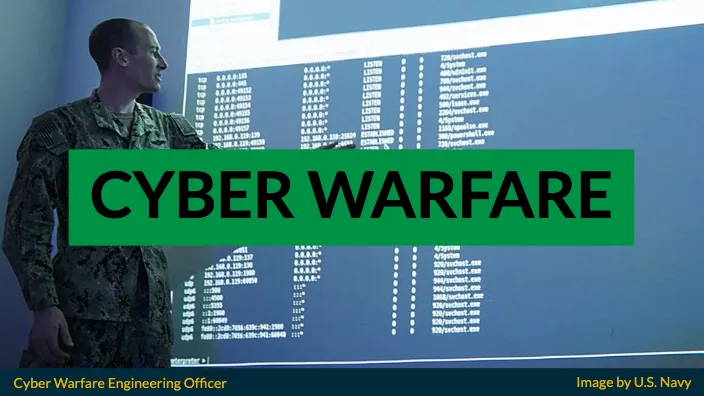Last Updated on March 4, 2024
This guide provides information that will help you become a Cyber Warfare Engineering Officer in the Navy during Fiscal Year 2024.
A Cyber Warfare Engineering Officer is a Restricted Line Officer in the Navy who uses computer science and cyber engineering ideas and methods to study, design, build, test, and evaluate software and firmware for computer network attack, exploitation, and defense in cyberspace operations.
The Navy Officer designator code for Cyber Warfare Engineering Officer is 1840.
Now, let us go into the details of this job.
Cyber Warfare Engineering Officer Job Description
Cyber Warfare Engineers (CWE) operate in the realm of cyber operations, defense, and strategic assaults.
CWEs utilize computer science and computer/cyber engineering ideas and methods to study, design, create, test, and evaluate software and firmware for computer network attack, exploitation, and defense in cyberspace operations.

Moreover, CWEs have extensive knowledge and technical competence in the following areas:
- Computer Programming (languages)
- Computer Architecture and Operating Systems (theory and application)
- Networking (protocols, programming, and technology)
- Cybersecurity (application, encryption, network security)
CWEs have specialized training in disruptive technologies, cyberspace capacity development, and the entire range of cyber security and operations.
If an adversary attempts to steal knowledge or disrupt capabilities, they will face the quick mental warfare skills of talented Naval Officers and enlisted Sailors who neutralize cyber threats and address cyber vulnerabilities.
Responsibilities
Here are some responsibilities of CWEs:
- Conduct research, design, development, testing, and evaluation of cyberspace operations software and firmware
- Utilize computer science and cyber engineering ideas and methods to develop software and firmware to protect our nation’s critical computer networks
- Provide protection against attackers and tactical benefits
- Develop tools and approaches for ensuring situational awareness in the information environment
- Assist the Information Warfare Community in achieving its purpose of gaining a thorough understanding of enemies’ inner workings and generating unrivaled knowledge of the battle space during wartime to ensure mission success
Work Environment
Cyber Warfare Engineers take on difficult assignments that need them to use their knowledge of computer network operations.
They are normally assigned to a shore-based Navy Information Operations Command (NIOC).
Tours with the CWE include assignments at the Navy Cyber Warfare Development Group, the Naval Information Warfare Center, the National Security Agency, and Fleet Cyber Command/US TENTH Fleet.
How to Become a Cyber Warfare Engineering Officer

To become a Cyber Warfare Engineering Officer, applicants must be American citizens who are between 18 and 42 years old with at least a bachelor’s degree and a GPA of at least 3.0 on a 4.0 scale. Desirable fields of study include information technology, science, mathematics, and engineering.
Here are the step-by step procedures to become a Navy CWE officer, along with the various Navy Cyber Warfare Engineering Officer requirements:
Step 1: Determine your eligibility
You must first determine your eligibility to compete for a Navy CWE officer position. The basic eligibility requirements for the Navy CWE program are listed below.
These application requirements are current as of May 2022, per the Navy Personnel Command. No updates have been issued so far.
Navy Cyber Warfare Engineering Officer Eligibility Requirements
| Citizenship | CWE officer applicants must be United States citizens. |
| Gender | There are no gender restrictions for the CWE officer program. |
| Age | The age limit for the Navy CWE officer program is between 18 and 42 years old upon commissioning. Waivers will be considered for applicants who are no older than 54 years of age. |
| Education | A baccalaureate degree from an accredited school is required. A cumulative grade point average (GPA) of 3.0 or above is necessary at the undergraduate level. Exceptional applicants with a total undergraduate GPA greater than 2.7 may request a waiver. A graduate-level degree awarded by an accredited institution with a cumulative GPA of 3.0 or better in the graduate program supersedes an undergraduate degree conferred with a non-qualifying GPA. Major disciplines of study in science, technology, engineering, and mathematics are necessary, with computer science and computer engineering degrees being recommended. Related technical majors that will be evaluated on an individual basis include, but are not limited to, mathematics, physics, software engineering, and other computer-related fields. Education/transcripts must demonstrate extensive courses in software development and/or computer programming with a least 3.0 GPA in those subjects. Applicants who do not fulfill the listed educational criteria must demonstrate a minimum of one year of software development and/or computer programming expertise. Candidates that are most qualified will fulfill both educational and experience criteria. |
| Physical | Selectees must maintain eligibility for sea duty and global assignment in accordance with Chapter 15 of the Medical Department’s Manual. |
| Course work | Applicants must have at least 30 credit hours of substantial computer programming and/or software development coursework with at least 3.0 GPA on a 4.0 scale. |
| Technical Skills | Significant technical proficiency in one or more critical skill areas, including as vulnerability analysis, reverse engineering, red team / blue team tool creation, computer forensics, low-level systems programming, and exploit development, is essential. Software engineering and computer programming knowledge, including technologies, languages, and projects important to cybersecurity and computer network operations, will be given special consideration. The best applicants will be able to demonstrate strong skill in the C programming language. Significant, established technical expertise in systems administration, network security, artificial intelligence, penetration testing, and machine learning will be taken into account. These talents, however, do not form a sufficient basis for selection and are not regarded a substitute for the technical skills mentioned in the preceding paragraph. |
Also Read: Navy OCS Guide for Officer Applicants
Additional Requirements for the CWE Officer Program
Technical Interview
All received Officer packages will be subjected to a technical examination by the CWE Senior Officer or their approved representative, which may necessitate interaction with the candidate.
Non-selects are applicants whose packages do not exhibit the required technical competence. The CWE Officer Community Manager will report non-selects to the CNRC.
Security Clearance Eligibility
Candidates must fulfill the eligibility requirements set out in the Director of National Intelligence’s (DNI) Intelligence Community Directive (ICD) 704 for access to sensitive compartmentalized material.
Prior to final selection, applicants nominated for commission into the Active Component must pass an initial suitability screening with the Fleet Cyber Command Security Directorate.
Being a dual citizen (i.e., a citizen of the United States and another nation) is not always disqualifying. Risks to national security shall be assessed on an individual basis, in accordance with ICD 704.
Step 2: Prepare your professional resume
If you have not prepared a current resume or curriculum vitae, it is best to start now. Once you contact your local recruiter, they will ask you for your current resume before you can apply for Navy CWE officer positions.
Your local officer recruiter may even ask you for a resume that is signed and dated by hand.
Step 3: Contact local officer recruiter
You then must contact your local officer recruiter. They will be able to provide you with the current Navy CWE officer position availability, and any other nuanced requirements for the upcoming Navy CWE officer selection board.
The recruiter will ask you to provide basic identification documents as proof of eligibility (e.g., birth certificate, passport, social security card, etc.), along with your college transcripts and current resume.
Step 4: Complete Navy NASIS
Prior to commissioning, a National Agency Check, Local Check inquiry, or its equivalent must be completed.
The Navy Accessions Security Information System (NASIS) collects information from prospective Naval Officers to launch personal security investigations for all Navy personnel.
To begin an inquiry, the information for a security clearance investigation is submitted to the Joint Personnel Adjudication System (JPAS).
NASIS is the Navy’s data collecting mechanism for security clearances, and it communicates with JPAS.
Prior to commissioning, all future Navy Officers must complete the SF-86 request for security clearance and have an open investigation.
Your recruiter will provide you guidance on how to log-in to your NASIS account. You must complete this as accurately as possible.
Step 5: Complete Physical Exam at MEPS
Once you submit all medical paperwork to your officer recruiter, they will schedule you for your full physical exam at MEPS.
MEPS (Military Entrance Processing Stations) are joint-service facilities run by the Department of Defense that employ both military and civilian personnel.
Moreover, MEPS evaluates applicants based on their physical qualities, intelligence, and moral standards as defined by each branch of military service.
Hotel accommodation may be available for MEPS upon request.
Step 6: Acquire professional references
Navy CWE officer program applicants may acquire endorsements from Senior Navy Officers or senior enlisted, whether active duty, reserve, or retired, to be included in the application.
Prior or current work supervisors or college professors are typical references of Navy Officer applicants.
Step 7: Write motivational statement
The Officer Selection Board receives complete information about you from the Application Processing and Summary Record (APSR).
Within the APSR form, there is space to write a motivational statement. You must ensure that your motivational statement fits within the allotted space in the APSR form.
Your motivational statement should answer the following questions:
- Why do you want to be a Navy CWE officer?
- Why do you want to be a Naval Officer?
- What do you offer to the Navy?
- Why should the selection board choose you?
Step 8: Complete application paperwork
At this point, your officer recruiter will present you with some paperwork that is required to be submitted with your CWE officer program application.
Complete these forms as accurately and promptly as you can.
Once complete, your application for the Navy CWE officer program will be submitted to the Navy Cyber Warfare Engineering Officer selection board.
Selection results typically are released 30 to 45 days (about 1 and a half months) after the Navy Cyber Warfare Engineering Officer selection board convening date.

Additional Navy CWE Officer Application Information
Application Waivers
If an applicant does not fulfill all the standards but has an extraordinary record or demonstrated skill set that the Navy needs, a waiver may be granted in restricted quantities.
Constructive Entry Credit
For candidates who have prior commissioned officer experience and/or the following CWE-related credentials: graduate education, industry certifications, or extensive work experience; the Commanding Officer, NCWDG will chair a professional review board that will evaluate the candidate’s record/resume and determine eligibility for constructive entry credit.
The CWE Officer Community Manager will assess and accept recommendations from the professional review board for accessions above O-1/ensign.
Service Obligation
CWE officer program selectees are obligated to serve on active duty for five years from the date of appointment.
The obligation begins at the time of commissioning.
The remainder of the service required to fulfill eight years of total obligatory service may be spent in the Ready Reserve status.
More Information
If you want more information about becoming a Cyber Warfare Officer, the next logical step is to contact a Naval Officer Recruiter.
Let us start figuring out how you can benefit from becoming a Navy CWE officer – or if it is even the right career move for you.
Others also read more information from our articles about other closely related Navy Officer jobs, such as the Cryptologic Warfare Officer program and the Navy Intelligence Officer program.
Hope you found this helpful to your career planning.


